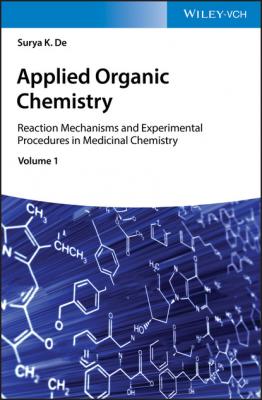Applied Organic Chemistry. Surya K. De
Читать онлайн.| Название | Applied Organic Chemistry |
|---|---|
| Автор произведения | Surya K. De |
| Жанр | Химия |
| Серия | |
| Издательство | Химия |
| Год выпуска | 0 |
| isbn | 9783527828173 |
728 704
729 705
730 706
731 707
732 708
733 709
734 710
735 711
736 712
737 713
738 714
739 715
740 716
741 717
742 718
743 719
744 720
745 721
746 722
747 723
748 724
749 725
750 726
751 727
752 728
753 729
754 730
755 731
756 732
757 733
758 734
759 735
760 736
761 737
762 738
763 739
764 740
765 741
766 742
767 743
768 744
769 745
770 746
771 747
772 748
773 749
774 750
775 751
776 752
777 753
778 754
779 755
780 756
781 757
782 758
Applied Organic Chemistry
Reaction Mechanisms and Experimental Procedures in Medicinal Chemistry
Surya K. De
Volume 1
Copyright
Author
Dr. Surya K. De
Supra Sciences
San Diego, CA
United States
Cover Image:
© enot‐poloskun/Getty
All books published by Wiley‐VCH are carefully produced. Nevertheless, authors, editors, and publisher do not warrant the information contained in these books, including this book, to be free of errors. Readers are advised to keep in mind that statements, data, illustrations, procedural details or other items may inadvertently be inaccurate.
Library of Congress Card No.:
applied for
British Library Cataloguing‐in‐Publication Data
A catalogue record for this book is available from the British Library.
Bibliographic information published by the Deutsche Nationalbibliothek
The Deutsche Nationalbibliothek lists this publication in the Deutsche Nationalbibliografie; detailed bibliographic data are available on the Internet at <http://dnb.d-nb.de>.
© 2021 WILEY‐VCH GmbH, Boschstr. 12, 69469 Weinheim, Germany
All rights reserved (including those of translation into other languages). No part of this book may be reproduced in any form – by photoprinting, microfilm, or any other means – nor transmitted or translated into a machine language without written permission from the publishers. Registered names, trademarks, etc. used in this book, even when not specifically marked as such, are not to be considered unprotected by law.
Print ISBN: 978‐3‐527‐34785‐8
ePDF ISBN: 978‐3‐527‐82815‐9
ePub ISBN: 978‐3‐527‐82817‐3
oBook ISBN: 978‐3‐527‐82816‐6
Preface
Organic chemistry is a constantly developing and expanding field of science because of its infinite research and application possibilities. Clear understanding of organic chemistry concepts, including the mechanistic aspects of organic reactions, helps chemists design drug molecules with the power to save human lives.
This textbook is targeted to advanced undergraduates and postgraduate students in all areas of organic, bioorganic, pharmaceutical, and medicinal chemistry. Professional researchers may utilize it as a handbook due to its references to original literature, recent reviews, and application of named reactions and reagents frequently used in organic synthesis. This book also covers, step by step, the mechanism of selected reactions that are part of undergraduate and postgraduate curricula. The definition of each named reaction with its original reference(s), i.e. the first one or others if applicable, current reviews, and their applications (sourced from Journal of Medicinal Chemistry and others) are also included. Heterocyclic compounds have important biological activities, so the nomenclature and application of heterocyclic compounds have been summarized in Chapter 9. In addition, Chapter 12 presents preliminary concepts regarding solution‐phase and solid‐phase peptide syntheses. For synthetic stand points, common organic reagents and functional groups transformation are discussed in Chapters 13–16.
References included in this book are available on PubMed (https://www.ncbi.nlm.nih.gov/pubmed) or https://pubs.acs.org. The experimental procedure of each reaction can be found on Google Patents (http://patents.google.com).
I would like to express great thanks to Dr. Ramkrishna De (Vertex Pharmaceuticals) for reviewing the manuscript and providing valuable suggestions. Also, Dr. Maloy Kumar Parai provided some assistance in preparing the manuscript.
I would like to express great
